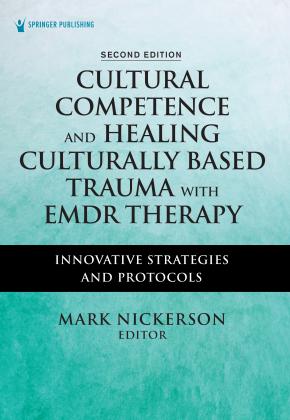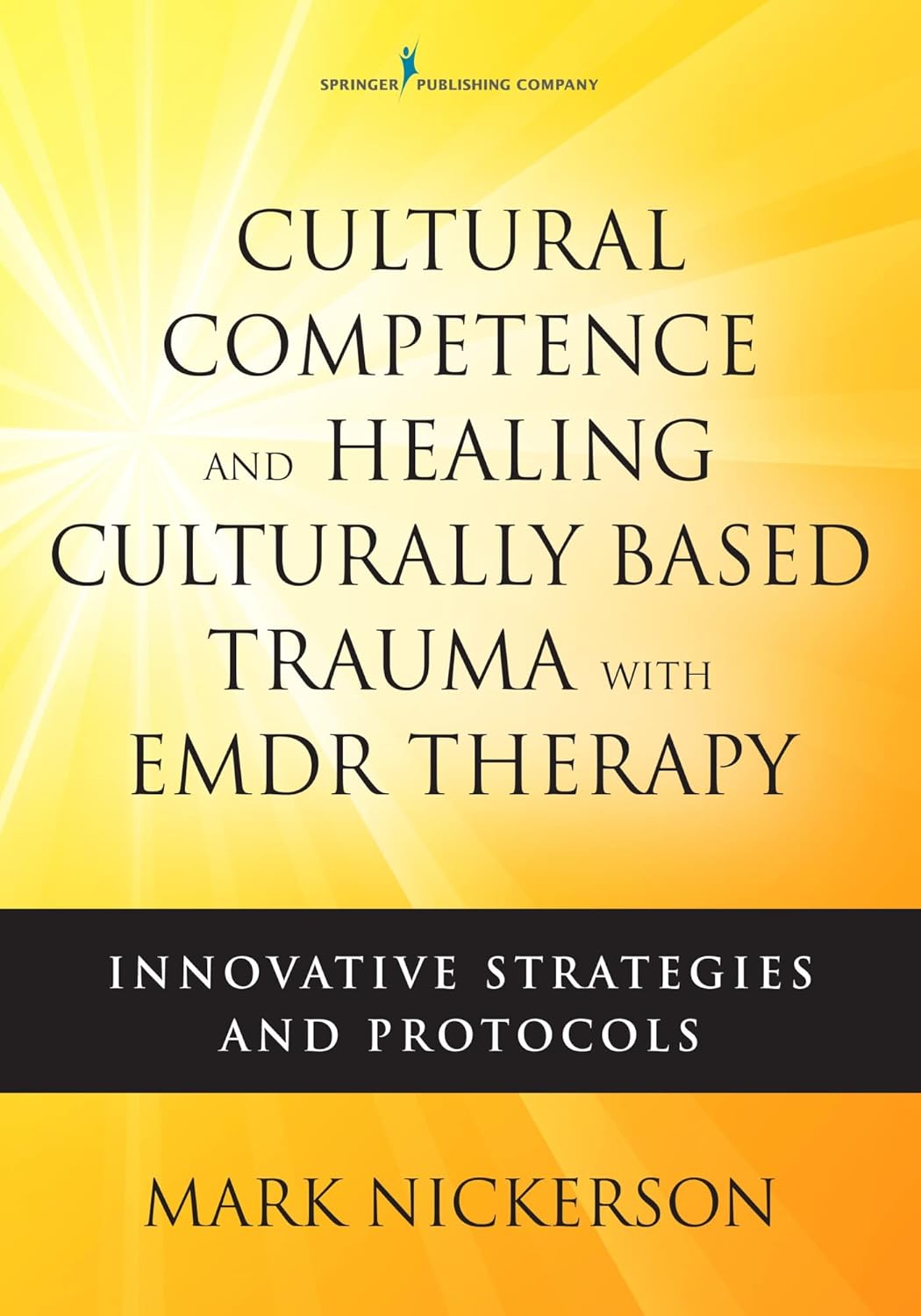Cultural Competence and Healing Culturally Based Trauma With EMDR Therapy: Innovative Strategies and Protocols, 2nd Edition
Tools for developing a culturally competent EMDR clinical practice and strategies for working with specific cultural populations.
Book Description
“Over twenty-five authors combine to address a diverse range of current and emerging topics. Ten new second edition chapters include a call for broader recognition of culturally based trauma and adversity within the trauma field, the core human need for connection and belonging, and strategies for clinician self-reflection in developing a culturally competent clinical practice that is multicultural inclusive, actively anti-oppressive, and grounded in cultural humility. Other new chapters offer considerations in working with Black, American Indian, Asian-American, and Latinx clients; immigration challenges; and social class identity.
Overall, this book provides graspable conceptual frameworks, useful language and terminology, in-depth knowledge about specific cultural populations, clinical examples, practical intervention protocols and strategies, research citations, and additional references. This text speaks not only to EMDR practitioners but has been recognized as a groundbreaking work for therapists in clinical practice.
Key Features:
- Twenty-eight contributing authors with diverse professional and lived experiences
- Best-practice methods for cultural competence integrated into EMDR therapy
- Culturally attuned clinical assessment and case formulation
- Innovative protocols and strategies for treating socially based trauma and adversity
- Enriches the adaptive information processing model with research-based knowledge of social information processing
- Specific chapters devoted to LGBTQIA+ issues and transgenerational cultural trauma including antisemitism
- Strategies and a protocol for dismantling social prejudice and discrimination
- Combines conceptual theory with practical application examples and methods”
—Description from publisher
Table of Contents
Section I: Enhancing Cultural Competence and Addressing Culturally Based Trauma and Adversity in EMDR Therapy
- Chapter 1: Cultural Competence and EMDR Therapy / Mark Nickerson
- Chapter 2: Connection and Belonging: A Core Human Need—Implications Within EMDR Therapy / Mark Nickerson
- Chapter 3: Culturally Based Trauma and Adversity: Recognition, Definition, and Implications / Mark Nickerson
- Chapter 4: The Work Starts with us: Personal Reflection, Assessing your Practice, and Setting Goals / Mark Nickerson
- Chapter 5: Opening the Door: Exploring Social and Cultural Experiences and Building Resources—EMDR Phases 1 and 2 / Mark Nickerson
- Chapter 6: Healing and Resilience Building with EMDR Reprocessing: Target Selection and EMDR Phases 3 to 6 / Mark Nickerson
- Chapter 7: Dismantling Prejudice with EMDR Therapy / Mark Nickerson
Section II: Multicultural, Intersectional, and Antiracist Approaches to Psychotherapy
- Chapter 8: Strategies for Implementation of an Anti-Oppressive, Antiracist, Intersectional Lens in EMDR Therapy with Black Clients / Wendy Ashley, Allen E. Lipscomb
- Chapter 9: EMDR Therapy and Consultation with an Intercultural Approach / Viviana Urdaneta
Section III: Race, Ethnicity, and Social Class
- Chapter 10: Culturally Informed Recommendations for EMDR Therapy with American Indians / Jordanna L. Saunders
- Chapter 11: Considerations when Working with Asian Americans in EMDR Therapy / Cheryl Kenn
- Chapter 12: Cultural And Treatment Considerations When Using EMDR Therapy With Latinx Clients / Viviana Urdaneta, Viviana Triana
- Chapter 13: The Transgenerational Impact of Anti-Semitism / Karen Alter-Reid, Ruth Heber
- Chapter 14: Social Class as Cultural Identity and its Unique Contributions in EMDR Intervention / Jeff DiNardo
Section IV: Immigration, Refugee/Asylum Seekers, and Acculturation
- Chapter 15: Clinical Considerations When Treating Immigration-Based Trauma Within Latinx Clients Using EMDR Therapy / Cecilia C. Penailillo
- Chapter 16: Culturally Attuned EMDR Therapy with an Immigrant Woman Suffering from Social Anxiety / Barbara Lutz
- Chapter 17: The EMDR Approach Used as a Tool to Provide Psychological Help to Refugees and Asylum Seekers / Paola Castelli Gattinara, Antonio Onofri, Cristina Angelini
Section V: LGBTQ Issues: Sex, Gender, and Affectional Orientations
- Chapter 18: EMDR Therapy as Affirmative Care for Transgender and Nonbinary Clients / Sand C. Chang
- Chapter 19: EMDR Therapy With Lesbian/Gay/Bisexual Clients / John M. O’Brien
- Chapter 20: Sex, Gender, and Affectional Identities and Intersectionality: Expanding Application of Gender Diversity / Earl Grey
Section VI: Specific Cultures and Social Stigma
- Chapter 21: Left Out and Left Behind: EMDR and the Cultural Construction of Intellectual Disability / Joseph C. Yaskin, Andrew J. Seubert
- Chapter 22: “People Like Me Don’t Get Mentally Ill”: Social Identity Theory, EMDR, and the Uniformed Services / Liz Royle
- Chapter 23: EMDR With Issues of Appearance, Aging, and Class / Robin Shapiro
Section VII: Innovative EMDR Protocols
- Chapter 24: Legacy Attuned EMDR Therapy: Toward a Coherent Narrative and Resilience / Natalie S. Robinson
- Chapter 25: EMDR in a Group Setting (GEMDR) / André Maurício Monteiro
Section VIII: Global Frontiers of EMDR Intervention
- Chapter 26: Learning EMDR in Uganda: An Experiment in Cross-Cultural Collaboration / Rosemary Masters, Elizabeth McConnell, Josie Juhasz
- Chapter 27: EMDR Therapy in Diverse Cultural Contexts / John Hartung
Book Access
Purchase/Subscription Required
Nickerson, M. (Ed.). (2022). Cultural Competence and Healing Culturally Based Trauma With EMDR Therapy: Innovative Strategies and Protocols, 2nd edition. Springer Publishing Company. https://doi.org/10.1891/9780826163424
Date
September 1, 2022
Creator(s)
Mark Nickerson
Contributor(s)
Karen Alter-Reid, Cristina Angelini, Wendy Ashley, Paola Castelli Gattinara, Sand C. Chang, Jeff DiNardo, Earl Grey, John Hartung, Ruth Heber, Josie Juhasz, Cheryl Kenn, Allen E. Lipscomb, Barbara Lutz, Rosemary Masters, Elizabeth McConnell, André Maurício Monteiro, John M. O’Brien, Antonio Onofri, Cecilia C. Penailillo, Natalie S. Robinson, Liz Royle, Jordanna L. Saunders, Andrew J. Seubert, Robin Shapiro, Viviana Triana, Viviana Urdaneta, Joseph C. Yaskin
Client Population
Immigrants/Refugees, LGBTQIA+, Racial/Cultural/Ethnic Groups
Practice & Methods
DEI/IDEA, Protocols
Extent
437 pages
Publisher
Springer
Rights
Copyright © 2023 Springer Publishing Company, LLC. All rights reserved.
APA Citation
Nickerson, M. (Ed.). (2022). Cultural Competence and Healing Culturally Based Trauma With EMDR Therapy: Innovative Strategies and Protocols, 2nd edition. Springer Publishing Company. https://doi.org/10.1891/9780826163424
Audience
EMDR Therapists, Other Mental Health Professionals
Language
English
Content Type
Book
Access Type
External Resource, Paid Access





